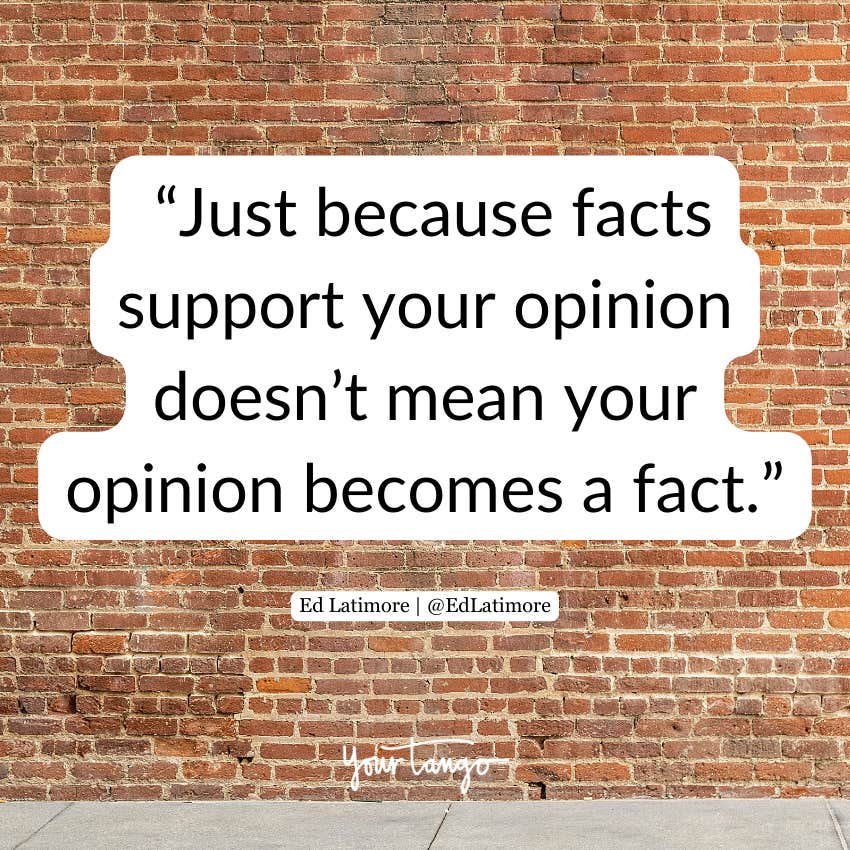The One Thing You Need To Ask Yourself Before Offering Anyone Your Opinion
Contrary to popular opinion, not everybody wants — or more importantly, needs — to hear yours.
 mediaphotos from Getty Images Signature
mediaphotos from Getty Images Signature I'm gonna get into a question that few people ever think about, but it can have a profound impact on your life — what are your opinions worth to you?
Before we dig into it, here’s a short primer on the difference between an opinion and a fact.
What is an opinion?
I’ll offer my personal definition of an “opinion” — this isn’t taken from a Google search or a dictionary.
I think it’s important to think deeply about the meaning of certain ideas and concepts and explain them using your own words and understanding. If you don’t do this, then you risk parroting off phrases that seem correct but, upon scrutiny, prove to be imprecise and wrong (at best).
An opinion is a non-falsifiable interpretation of objective information.
Put another way, opinions aren’t facts, but they can be motivated by facts.
What is a fact?
Facts are simple to define. A fact is a piece of information that is:
- Objectively consistent. It doesn’t change properties based on how you feel about it, where you’re from, or where you are.
- Repeatable. It is always the same. There are no exceptions that don’t arise without introducing something new.
- Testable. It can be challenged by other facts or information to test its accuracy and validity.
- Falsifiable. It says something that can be shown to be wrong. It won’t necessarily be wrong, but there is a clear condition where the fact is incorrect or inapplicable.
Facts are testable observations about the world. Opinions are interpretations of those facts.
Agreeing with a fact and rephrasing it is not an opinion. That’s a fact, and it’s fairly obvious. What’s not so obvious is that just because facts support your opinion doesn’t mean your opinion becomes a fact.

What are your opinions worth to you?
People value their opinions along a spectrum.
On the one extreme, there are people who think their opinion is gospel.
They feel like their interpretation of the world is the correct one, everyone must know about it, and everyone who disagrees with it is wrong. We used to ignore these people, but social media has given everyone a voice — for better or worse.
On the other end of the spectrum, there are people who can’t think for themselves.
They aren’t low intelligence, but they are easily talked into things, believe whatever most people believe, and tend to avoid any confrontation.
People with no opinions are just as obstinate, ornery, and annoying as people with too many, each for different reasons. However, they both lack the ability to think critically.
Opposites become indistinguishable at their extremes. If you find yourself closer to either extreme than you like, I recommend you take the middle road.
What moderation actually looks like
When I mention that I’m a moderate, people on both sides quickly point out that moderates don’t exist and that I need to pick a side. This is the state of things: where moderation is considered a negative.
But moderation of your opinions isn’t about sitting on the fence. It’s about consciously deciding what to have an opinion about, carefully considering the opinion that you have, and being able to quickly modify or discard that opinion in the face of new information.
This is my long way of saying that you should have “strong opinions, loosely held.”
Most people are controlled by their opinions to the point where they will ruin all sorts of opportunities and prospects simply because they have to express how they feel about something. Even worse are people who use the excuse of “giving their opinion” or “being honest” to be cruel to people.
Treat your opinions as a tool you use rather than an extension of yourself. This way, you can quickly change your opinion when doing so feels authentic to you.
There's one question you need to ask yourself before offering your opinion to anyone.
This may seem disingenuous, but this is where you have to ask yourself, “How much is your opinion worth to you?”
The answer will vary depending on the circumstances, but you should consider what you stand to lose and what you stand to gain.
I can’t tell you what to personally value. All I can do is get you to think about the trade-offs and perhaps give you a useful metric:
If you aren’t willing to take proactive action to defend your opinion that could cause you harm, then it’s probably not worth losing friendships, relationships, or employment over. In other words, if you don’t live it, don’t let it ruin your life.
Ed Latimore is a retired American professional boxer, influencer, and best-selling author. His work focuses on self-improvement and a practical approach to Stoic philosophy.
